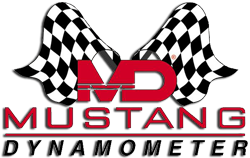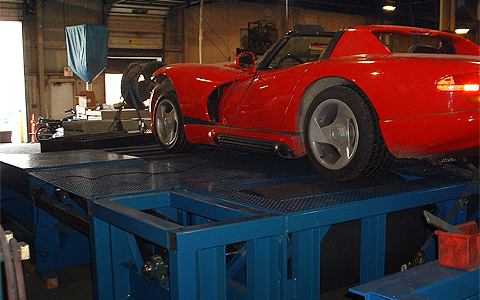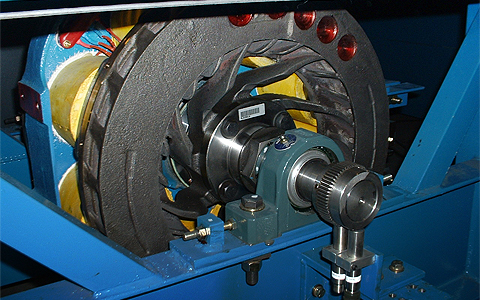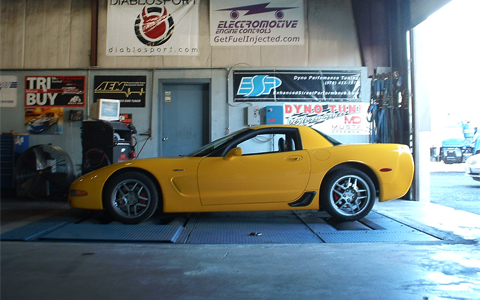 |
Mustang 1100-SE AWD Chassis Dynamometer |
What is a chassis dyno?
A chassis dyno (dynamometer) is a high-tech piece of equipment that accurately measures the horsepower and torque curve of the vehicle. This machine capable of measuring up to 1100 wheel horsepower for all front, rear, and AWD cars and trucks (including dually trucks) and even motorcycles! The chassis dyno not only measures horsepower, but provides a means for diagnostics and precision tuning of all vehicles.
Ever wonder if all of those modifications made to your vehicle really perform as they have claimed? Wonder no more. The dyno provides a means for measuring your vehicles’ power both prior to making any changes (baseline run) as well as after modifications have been performed. By varying only one parameter at a time, one can see just how much each individual change effects power.
The chassis dyno allows for tuning both fuel injected and carbureted vehicles for optimum power and reliability under full throttle driving conditions. By changing such parameters as air/fuel ratio and ignition timing, the tuner is able to see real-time data and make adjustments accordingly.
The dyno is a useful tool for street vehicles and high-power drag cars alike. Regardless of the power level sought, all vehicles modified beyond stock horsepower levels can benefit from tuning on a fully-capable chassis dynamometer.
Why is ESP’s dyno better than others?
The Mustang 1100-AWD-SE dyno is one of the most sophisticated chassis dynamometer available today. Many other dynamometers rely only upon the inertia of the roller to provide the necessary resistance needed to measure the horsepower of the vehicle. While this may be sufficient for obtaining an overall horsepower number, these dynamometers are incapable of putting additional load on the vehicle. The Mustang dynamometer utilizes an Eddy Current to apply load to the vehicle, allowing for steady-state and part throttle tuning/fuel calibrating, true road load simulation, full ¼ mile passes, 1/8 mile passes, and more. The dyno has a fully capable data acquisition system, allowing precise measurement of boost/vacuum levels, air/fuel ratios, and all atmospheric conditions.
For more information on our particular chassis dyno and its capabilities, please visit the manufacturers’ web site at www.MustangDyne.com.
How much horsepower will I gain from dyno tuning?
Each and every vehicle will vary when it comes to gaining power from dyno tuning. This greatly depends on the extent of the modifications performed on the vehicle, as well as the overall tune of the vehicle prior to dyno tuning. For example, a forced induction vehicle with a large amount of performance upgrades generally has more room to gain horsepower by dyno tuning than a naturally aspirated vehicle with only an aftermarket exhaust.
How is a chassis dynamometer different from an engine dyno?
While an engine dynamometer measures the rotational force, or torque, at the flywheel of the engine, the chassis dynamometer measures the force that reaches the contact patch on the tires. Therefore, the chassis dyno produces a number equivalent to the horsepower at the wheels of the vehicle and includes all losses through the transmission, differential, axles, and finally through the wheel and tire.






